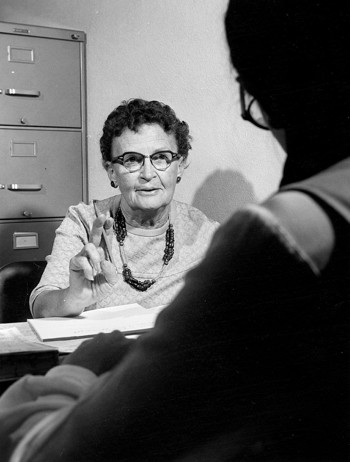COVER STORY SIDEBAR
Faculty legends: Alice Cook

Alice Cook. Photo: Division of Rare and Manuscript Collections. See larger image
When it came time to choose the name of a legendary faculty member to grace the first house in the West Campus Housing Initiative, Alice Cook (1903-98) was at the top of the list.
Described as "a passionate advocate for improving the well-being of female workers" by colleague Ronald G. Ehrenberg, the Irving M. Ives Professor of Industrial and Labor Relations and Economics, Cook had come to Cornell in 1952 already with 30 years of field experience as a labor educator, scholar and activist.
It was in the 1920s, right out of college, that Cook had her first taste of union organizing as a secretary with the YMCA's Industrial Department, which provided education and support to domestic servants and other blue-collar women. In the 1930s, she did graduate studies on adult and labor education in Germany, and then, after World War II, the U.S. government sent her back to re-establish democratic unions through adult education. Upon her return to the states, the School of Industrial and Labor Relations recruited Cook to direct a project, Integrating Unions and Community. Her subsequent decades of scholarship conducted around the world on the subject of women and trade unions are classics of comparative labor relations.
In the 1970s and '80s, Cook became one of the nation's leading advocates for "comparable worth," a policy that requires males and females in different occupations doing jobs of comparable value to a firm be paid equal wages. Ehrenberg, who was researching this topic at the time, was skeptical of its merits. Cook offered him full access to her files and the use of any of her data in his own work.
"I thought this extraordinary," Ehrenberg says. "She was a true academic; while she wanted her position to carry the day, she did not want to win by suppressing evidence that might be useful to opponents. I miss her greatly."
In and out of the classroom, Cook continuously broke new ground. The late President Dale Corson appointed her Cornell's first ombudsman, where she established procedures for that office that remain essentially unchanged to this day.
But Isaac Kramnick, the Richard J. Schwartz Professor of Government who as vice provost for undergraduate education was a key player in the conception and development of the house system, thinks that perhaps Cook will be best remembered on campus for a lunch one afternoon in the late 1960s. "She walked into the all-male faculty club, ordered lunch, sat down and thoroughly enjoyed it," he recalls. "With one stroke, Cornell's lunch counter was forever after integrated."
– Metta Winter